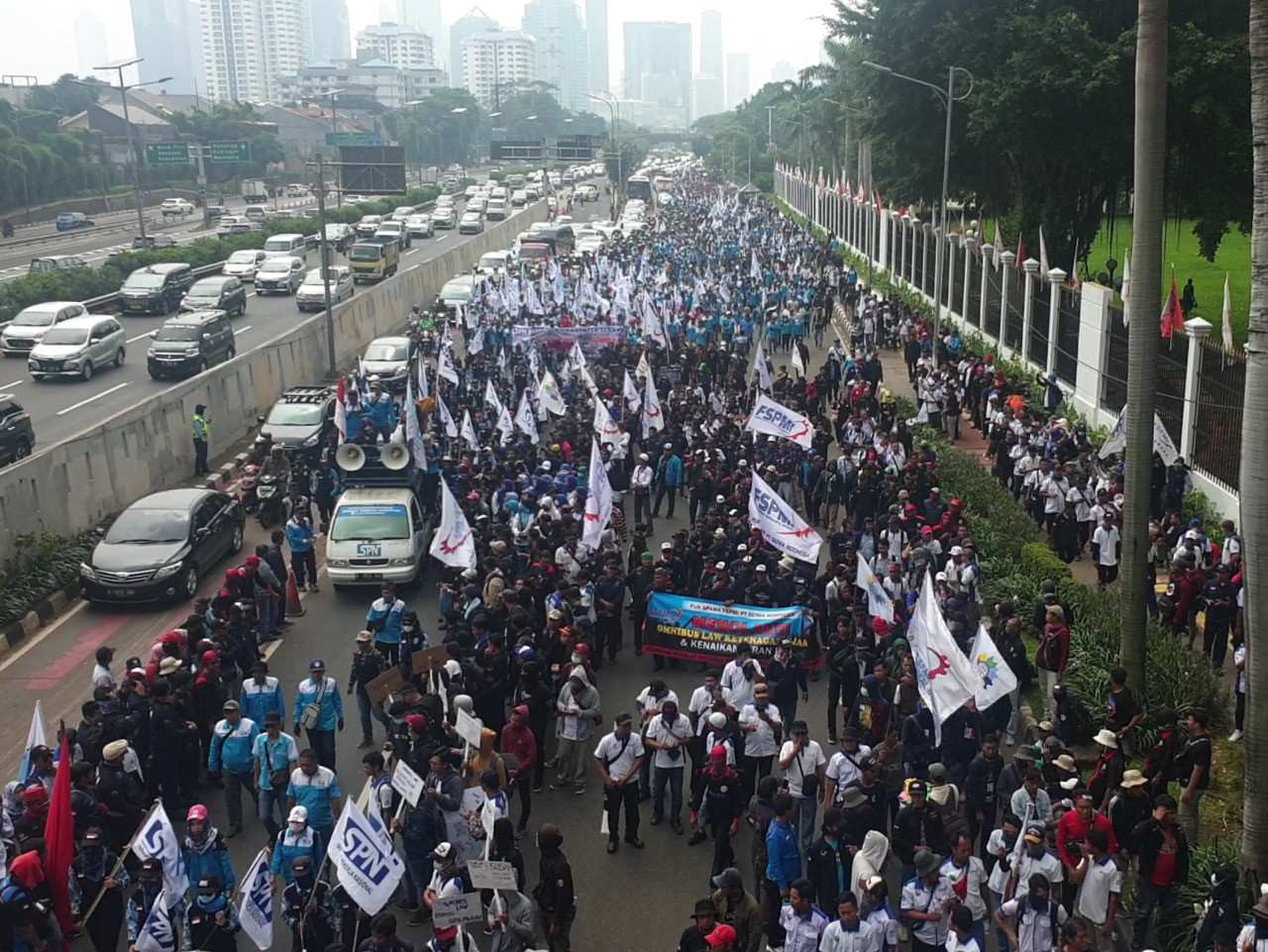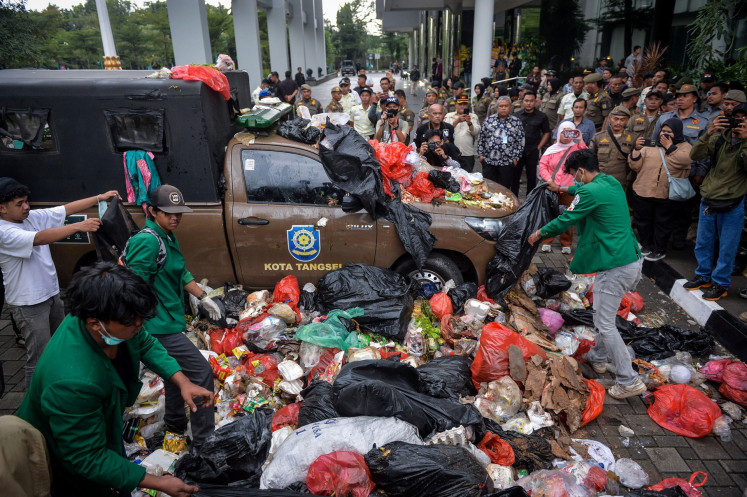Popular Reads
Top Results
Can't find what you're looking for?
View all search resultsPopular Reads
Top Results
Can't find what you're looking for?
View all search resultsLabor leader Said Iqbal and the prospects of his new Labor Party
Many are skeptical about the Labor Party’s future because the requirements to set up a political party are extremely complicated, and beating the legislative threshold is no less difficult.
Change text size
Gift Premium Articles
to Anyone
L
ast week, Confederation of Indonesian Trade Unions (KSPI) chairman Said Iqbal proved yet again his ability to mobilize thousands of workers to put pressure on the government to cancel or change laws or regulations harmful to workers.
The next challenge for Said is to lead his newly established Labor Party to success, knowing that Indonesians are less enthusiastic about supporting such a party. Having organized many demonstrations against government policies deemed against the interests of workers, he should also prove that the Labor Party is eligible to participate in the 2024 legislative election.
On Tuesday, protesters demanded that Manpower Minister Ida Fauziyah scrap a decree that says workers can withdraw the old-age benefits (JHT) only when they turn 56, their mandatory retirement age. The rule is set to take effect in May. Under the existing rules, workers who resign or have been laid off can receive the funds within just one month of filing their claim.
Earlier this week, President Joko “Jokowi” Widodo ordered Ida and Coordinating Economic Minister Airlangga Hartarto to accommodate the workers’ demands. The government’s about-face has earned Said another victory after his key role in orchestrating mass demonstrations to reject the Job Creation Law. The law was eventually passed by the House of Representatives, but later, the Constitutional Court declared it procedurally flawed.
The Court technically annulled the law but gave the government two years to fix it. International investors are waiting for Jokowi’s commitment to improving the law as soon as possible. When the law takes full effect, labor unions will again have to face a government that intends to weaken the labor movement.
In October of last year, Said announced the establishment of the new Labor Party. He claimed he was supported by the largest workers’ confederations. They are the 2.2 million-strong KSPI, the 3 million-member All Indonesia Workers Union Confederation (KSPSI), the 200,000-member Congress of Indonesian Unions Alliance (KSBI), the 200,000-member Confederation of Indonesian Prosperous Labor Unions (KSBSI) and the 100,000-member Confederation of Labor Unions of Struggle (KPBI).
Said has also expressed optimism that his party will gather 10 million members in 25 provinces, citing support from farmers’, fishers’, drivers’ and teachers’ groups. It is common for political parties or organizations to inflate their popular support while at the same time hiding their real sources of funding.
Said believes his party will meet all the legal requirements to run in the elections and eventually pass the 4 percent legislative threshold to sit in the House of Representatives.
Many, however, are skeptical about the Labor Party’s prospects because the requirements to set up a political party are extremely complicated, and beating the threshold is no less difficult.
According to the General Elections Law, a new political party is required to have branches in all 34 provinces, in at least 75 percent of regencies and cities and in 50 percent of all districts across the country. The party must also have a permanent headquarters and branch-level offices across the country.
After getting approval from the Law and Human Rights Ministry, the new party must then register with the General Elections Commission (KPU). At least 10 new political parties have expressed interest in applying for KPU verification.
History shows that Indonesian voters are not very supportive of labor-oriented parties. In 1999, the Labor Party, cofounded by prominent union leader Muchtar Pakpahan and three small labor parties, ran in the country’s first democratic election. Muchtar’s charisma, however, was not enough to attract voters. None of the parties passed the legislative threshold.
Similarly, in the 2004, 2009 and 2014 general elections, labor-oriented parties failed to perform.
Why do people have such little interest in labor parties?
First, there are too many labor organizations in Indonesia. Second, although many workers are registered as members of labor unions, they have their own political affiliations.
Third, major political parties also have strong affiliations with labor unions, and they are more effective in channeling workers’ interests and aspirations.
Fourth, during president Soeharto’s regime from 1966 to 1998, labor movements were associated with the outlawed Indonesian Communist Party (PKI). The ghost of PKI still haunts Indonesia more than 55 years after its demise.
Fifth, funding is one of the biggest challenges for any new political party. Big corporations and rich political elites have little appetite to invest in newcomers, especially workers’ parties.
Said is now putting his reputation as a skilled negotiator and organizer to the test, and his success leading several major peaceful demonstrations in Jakarta and other cities provides significant political capital for the movement. He has also reportedly collected funds to finance the party from various sources, as official contributions from workers alone cannot cover all the costs of well-organized street protests.
President Jokowi knows Said personally, as the two have met several times and the President reportedly offered Said a position in the administration, which Said declined. Police generals have often invited Said for discussions, especially during critical times such as mass demonstrations to demand minimum wage raises or to block the deliberation of bills considered unfriendly to workers.
Said publicly endorsed Prabowo Subianto in the 2014 presidential election, which Jokowi won, and was deeply involved in the noisy protests against then-Jakarta governor Basuki “Ahok” Tjahaja Purnama in 2017.
Said and other labor activists are on a difficult mission to ensure the new labor party will qualify for the 2024 elections, let alone be represented in the House.
Only time will tell if Indonesia will give labor unions a chance to formulate national policies from within, as is the case in some other democracies in the world.
***
The writer is senior editor at The Jakarta Post.











